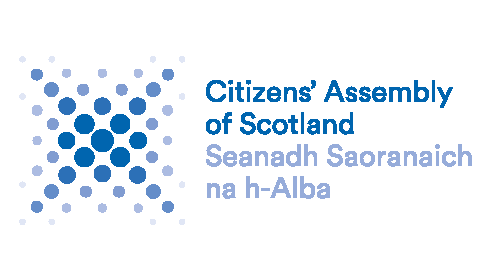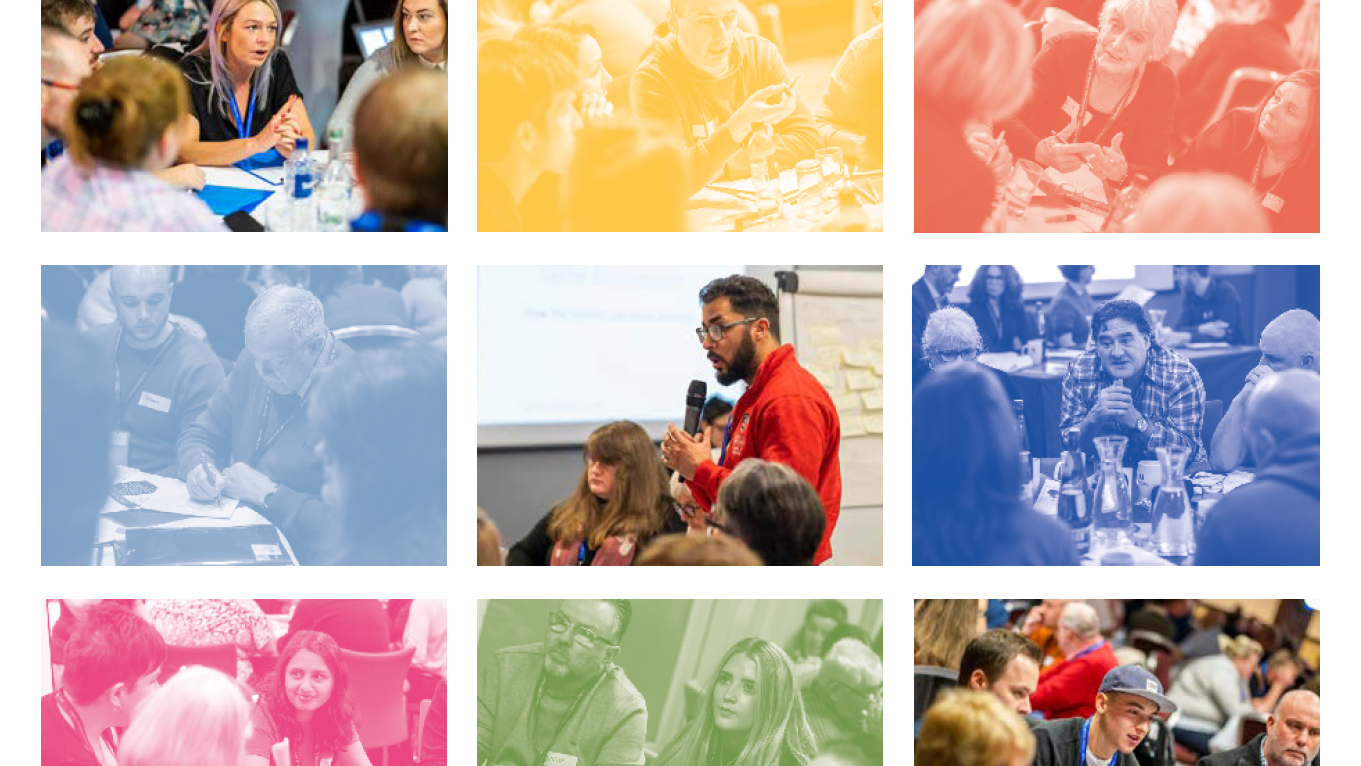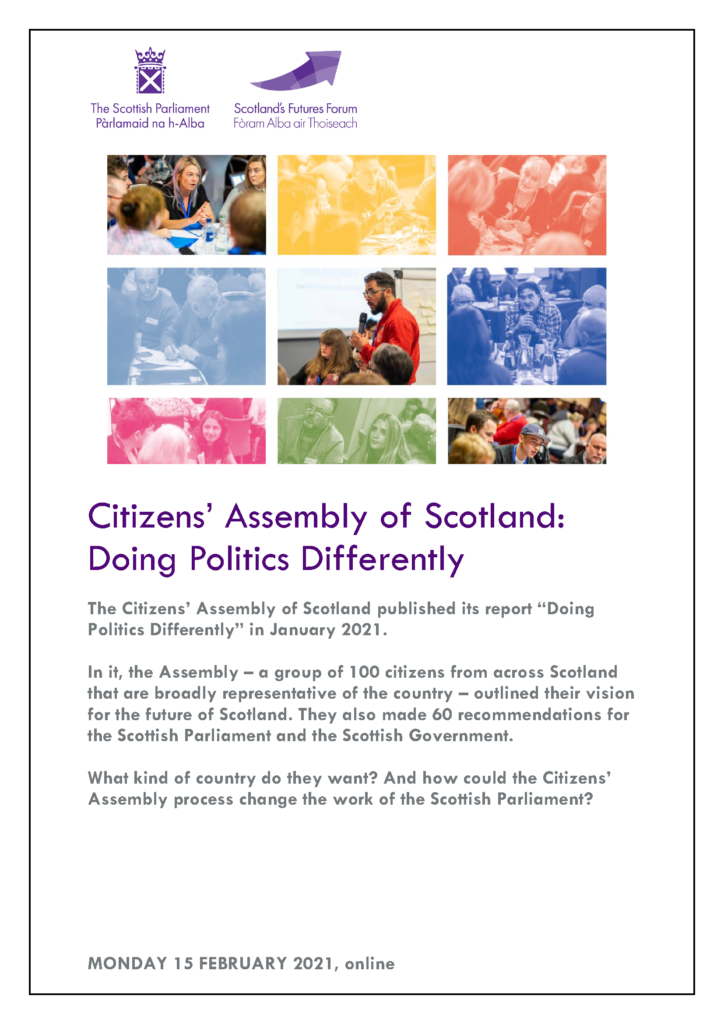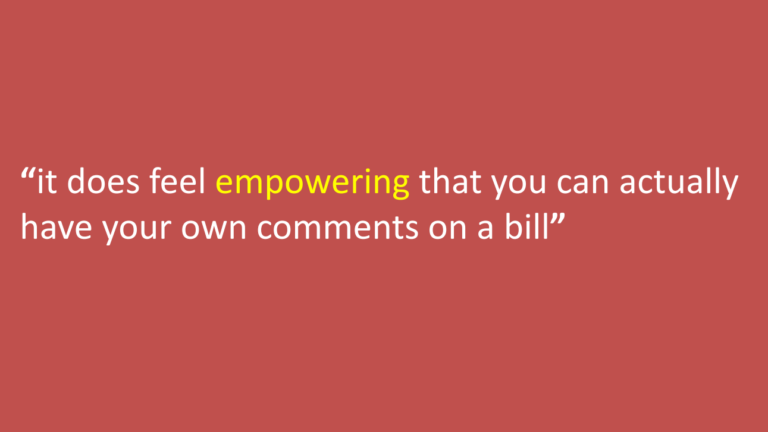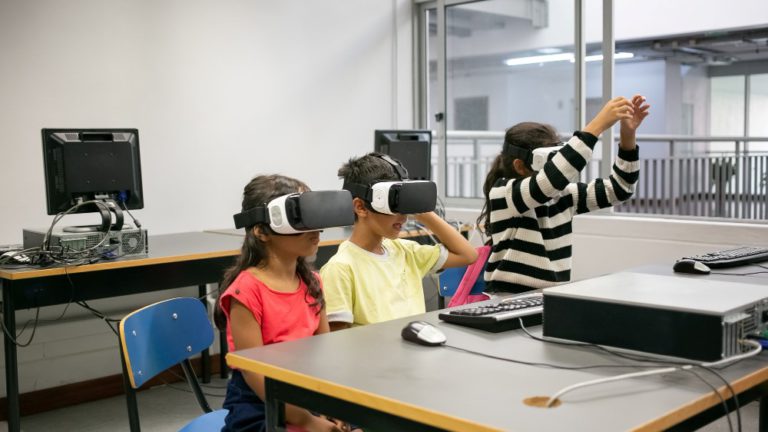Citizens’ Assembly of Scotland: Doing Politics Differently
Monday 15 February 2021, online
Introduction
As part of the Futures Forum’s remit to look creatively at how Scotland could and should be run, the Presiding Officer of the Scottish Parliament, Ken Macintosh MSP, chaired a special event on the work of the Citizens’ Assembly of Scotland.
In its work, the Assembly sought to address three questions:
- What kind of country are we seeking to build?
- How best can we overcome the challenges faced by Scotland and the world?
- What further work should be carried out to enable us to make informed choices about our country’s future?
Its report ‘Doing Politics Differently’, published in January 2021, outlines a vision for the future of Scotland, along with 60 recommendations on areas including poverty, taxation and sustainability.
Panel
The event featured an introduction from one of the Conveners of the Citizens’ Assembly, Kate Wimpress, and a Q&A with a selection of Assembly members: Shona, David, Evelyn, John and Charlotte.
There was also a cross-party panel of politicians: Stuart McMillan MSP (SNP), Claire Baker MSP (Scottish Labour), Lorna Slater (Scottish Greens) and Jenny Marr (Scottish Liberal Democrats).
Chair
As Presiding Officer of the Scottish Parliament, Ken Macintosh MSP is chair of Scotland’s Futures Forum board.
Other resources
- Read the Citizens’ Assembly of Scotland report “Doing Politics Differently”
- Read the SPICe briefing “Citizens’ Assemblies – an international comparison”
- Read the SPICe blog “Are citizens’ assemblies in Scotland here to stay?”
- Read the Scottish Government evaluation “Citizens’ Assembly of Scotland – research report”
Welcome
In welcoming participants to the event, the Presiding Officer thanked Assembly members for their work, ideas and commitment.
He highlighted the similarities between their remit and the Futures Forum’s commitment to providing a space to discuss ideas away from party politics.
Introduction to the Assembly
Kate Wimpress
Noting that the Assembly’s report “tells the story of the journey travelled by over 100 people from all backgrounds, walks of life and political views”, Kate highlighted the challenge of overcoming Scotland’s dividing lines to consider what a shared vision of the future might look like.
She expressed hope for “a positive and constructive response from policymakers” in the areas that the Assembly has identified as crucial to the country’s future, and for the establishment of “a new way of doing politics in Scotland”.
She also emphasised her hope that the conclusion of the Assembly’s work would represent “not a box ticked or a full stop, but rather a beginning, opening up a new chapter in our democracy with citizens at its heart, one which puts Scotland firmly at the forefront of democratic innovation globally”.
Discussion
With the aim of promoting productive conversation between the Citizens’ Assembly and Parliament, various questions were posed and answered by the Assembly members and by a cross-party panel of MSPs and party spokespeople.
The members explained the Assembly’s work and recommendations and its potential for transforming our country and Parliament. Several important themes and issues were explored.
Reaching consensus: politics in miniature
Assembly members were keen to emphasise that they had found working towards and achieving consensus a highlight of the Citizens’ Assembly. As Kate noted, the process had shown that “people can work together to find common ground on challenging and complex issues”.
The experience of coming together to reach agreement on the various recommendations was described as “absolutely amazing”, “a proper once-in-a-lifetime opportunity” and “exciting and rewarding”.
It was pointed out that the Assembly’s code of conduct gave everyone the opportunity to express an opinion on every subject. Members reported that, during the process, people had been quite happy to change their mind—a quality which, as the Presiding Officer noted, is often seen as “dangerous territory for politicians”.
While there was general agreement on the constructive and respectful nature of the process, views varied somewhat on the ease of reaching consensus in some areas. Participants conceded that there had been “a few slightly stickier points” that necessitated more in-depth discussion.
It was noted that reaching accord had been much easier in some areas than in others, with the Assembly’s report highlighting, as a percentage, the degree of consensus on each recommendation.
Members recalled, for example, that the recommendation to investigate the feasibility of a four-day working week had created some debate. A question was raised: was such disagreement caused by concerns about cost or, more broadly, by differing world views?
While it was acknowledged that issues such as money and the concept of independence are intrinsically difficult, participants emphasised that the Assembly process had been “a really good avenue, because it made navigating that much easier”.
It was pointed out that the Assembly’s experience in considering certain issues mirrored wider difficulties in achieving consensus in Parliament and society. Members agreed that working towards agreement had felt like “the part where we did politics in miniature”.
While it was considered that, in general, the Assembly had achieved an impressive degree of consensus in its report, doubts were raised as to whether it was really possible to do the same in Parliament— for example, finding common ground on issues such as taxation.
It was argued that the current party system makes that difficult, although it was pointed out that countries such as Nepal had found that a system with no parties did not always ‘work well either’.
On a more positive note, it was highlighted that there was a great deal of consensus at many levels in the Scottish Parliament, not least given that it was designed for precisely that purpose.
Transparency and trust
In seeking to build consensus in Scotland, the issue of trust in institutions, and especially in politicians, was highlighted as a key consideration.
In its report, the Assembly highlighted participation and engagement as important ways to build trust. Participants noted that levels of trust currently seem to be at an all-time low, although it was pointed out that it is a perennial issue that “constantly bedevils Parliament” and public life more generally.
It was argued that, in seeking to build trust, politicians have to reflect on how they can ensure greater transparency in the decision-making process. This linked in with the Assembly’s recommendation for more transparency in how money is raised and spent, in order to promote public trust and greater understanding of how Parliament operates.
The Parliament’s Public Petitions Committee was cited as an “inspirational and innovative model” globally, but it was argued that we need to look at fresher ways to make people feel more immediately engaged. The importance of nurturing democracy was emphasised, and citizens’ assemblies were described as “an important part of the process to rebuild trust between politicians and the public”.
Engagement with constituents was highlighted as hugely important; it was stressed that politicians need to listen to and engage with the electorate, and that “any politician who does not should not be a politician”.
In the context of the current lack of trust, Assembly members questioned how MSPs could convince the citizens of Scotland that they could be trusted to implement the report’s recommendations as quickly and fully as possible. A concern about “overpromising and underdelivering” was identified as a key issue.
It was emphasised that the Scottish Parliament had been established as a transparent and inclusive Parliament with open processes, and that while the Committee on the Scottish Government Handling of Harassment Complaints process, in particular, had stretched its operational mechanisms, it had shown that the Parliament takes such issues seriously and seeks to resolve them.
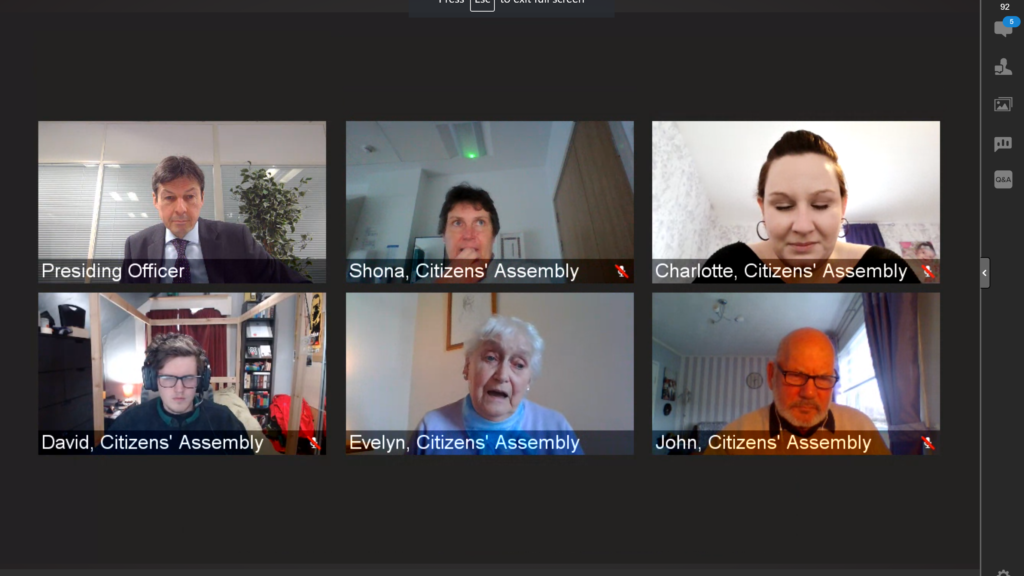
Delivery, dialogue and devolution
While there was optimism and enthusiasm about the potential inherent in the report’s recommendations, a note of caution was sounded regarding delivery. It was argued that, despite good intentions, delivery is complicated and challenging, especially in some areas.
The wide scope of the Assembly’s 60 recommendations was lauded, and the recommendations were described as “thought provoking”. Members identified the recommendations that they saw as most important, which included making zero-hours contracts illegal and— linking back to the theme of trust— requiring politicians to be more open and honest.
The politicians’ panel was interested in exploring some of the recommendations in more detail— for example, the recommendation on innovative forms of taxation. Assembly members talked about trying to make taxation fairer and how incentives could be found to promote employment and encourage action on green issues among smaller businesses.
Returning to the theme of consensus, it was noted that during the Assembly process, the common ground “always seemed to centre on green issues”. There was general agreement that a green recovery had to be part of our emergence from the pandemic. However, while it was affirmed that “we need to innovate ourselves out of the climate crisis”, it was stressed that delivery would be difficult.
Other specific recommendations that attracted a high degree of consensus were highlighted as important, but challenging. For example, Assembly members flagged up a desire to focus less on GDP as a measure of success, moving further towards a wellbeing economy instead. It was pointed out, however, that there were challenges in the context of global trade and cheap production abroad.
In addition, it was suggested that, although the Scottish Government’s National Performance Framework is based on criteria relating more to quality of life than to GDP, decision-making in practice had not kept up with that agenda. It was argued that while Scotland was at the start of that process, “we have a long way to go”.
Participants identified a specific issue with delivery; the fact that some policy areas are reserved to Westminster. It was pointed out that, as such, “dialogue between the Scottish Parliament and the UK Parliament will be hugely important”. It was suggested that, closer to home, delivery is primarily about devolution, and local authorities should be given the power and tools to do what is best in their own areas.
Returning to the theme of trust, it was argued that politicians had to be honest about the challenges and timescale for delivering on the recommendations in order to avoid making “a false promise”. It was reiterated that there was a huge amount of support among politicians regarding the report’s contents and the need for swift progress on taking forward some of the recommendations.
Nevertheless, participants accepted that there are still complex arguments to be had—for example, whether people would be willing to accept higher taxes to pay for new services. The need for real commitment from politicians was stressed, and Assembly participants were encouraged to read political party manifestos to see whether political parties were seeking to achieve the aims set out in the report.
The possibility of setting up a new citizens’ assembly to focus on the more challenging issues around delivery was raised, which led to a wider discussion of the role of assemblies in the future.
A future role for citizens’ assemblies
In the light of members’ positive overall experience of the process, and the Assembly’s recommendation to make greater use of citizens’ assemblies, participants discussed what a future role for assemblies might look like.
Specifically, the report recommended a citizens’ committee or house of citizens to consider legislation, as well as subject-based assemblies to deal with more contentious individual issues.
A question was raised as to whether a house of citizens would essentially be “a smaller version of the House of Lords”. Assembly members stressed that they did not wish to set up another layer of government— they simply thought that people should be more involved in what was happening in Parliament.
Participants discussed whether assemblies should be used to tackle more specific problems, such as poverty, in depth or whether the next stage of policy development should be reserved to Government. It was noted that there had already been a single-issue citizens’ assembly on climate change, and Ireland was cited as a successful example of where an assembly was used to try to reach consensus on a contentious issue. It was argued that smaller, more focused groups might be helpful in some cases.
Returning to the need for greater diversity and engagement, a strength of assemblies was described as their ability to bring in different points of view and expertise. It was asserted that “we need to harness all that knowledge and ability to make a better country”.
It was suggested that more citizens’ assemblies could reinvigorate the feeling of the ‘rainbow Parliament’ elected in Scotland in 2003, when smaller parties and independents brought in a range of different views. Participants argued that, by using the energy from a citizens’ assembly, “we could start to bring a more diverse picture and different voices” to the parliamentary process.
It was noted that the Parliament’s current consultation processes tended to connect more with representative organisations than with members of the public, and that a citizens’ assembly was “a good way to be more inclusive and engage with a broader set of views”.
It was argued that further assemblies could encourage a wider range of people to participate in civic life more broadly. Participants discussed whether involvement in the current Assembly process had “led younger people or women to consider getting involved in more traditional politics”.
It was stressed that politicians would need to ensure that any future assembly did not become simply “a consultation body that can be safely ignored”. It was argued that a citizens’ assembly should be taken seriously and “should be considered the people of Scotland speaking”.
It was argued that, overall, the initiation and development of citizens assemblies in Scotland has “opened the door and given us an opportunity to make a real difference”. Nevertheless, it was emphasised that, while the current conversation is an important starting point, we need to ensure that the work that Assembly members want to see is carried out.
Conclusion
In wrapping up the discussion, Kate highlighted a key lesson learned from her participation in the Assembly; the importance of having spaces where we can respect and listen to one another and think about how we want to live our lives.
She noted that, with proper support and a framework, people can and will change their minds on difficult and contentious issues.
Finally, Kate reiterated that, while politics can be difficult, “people are politics and politics are people”, and the more chances and opportunities we have to build frameworks like the Citizens’ Assembly, the better.
Partners
